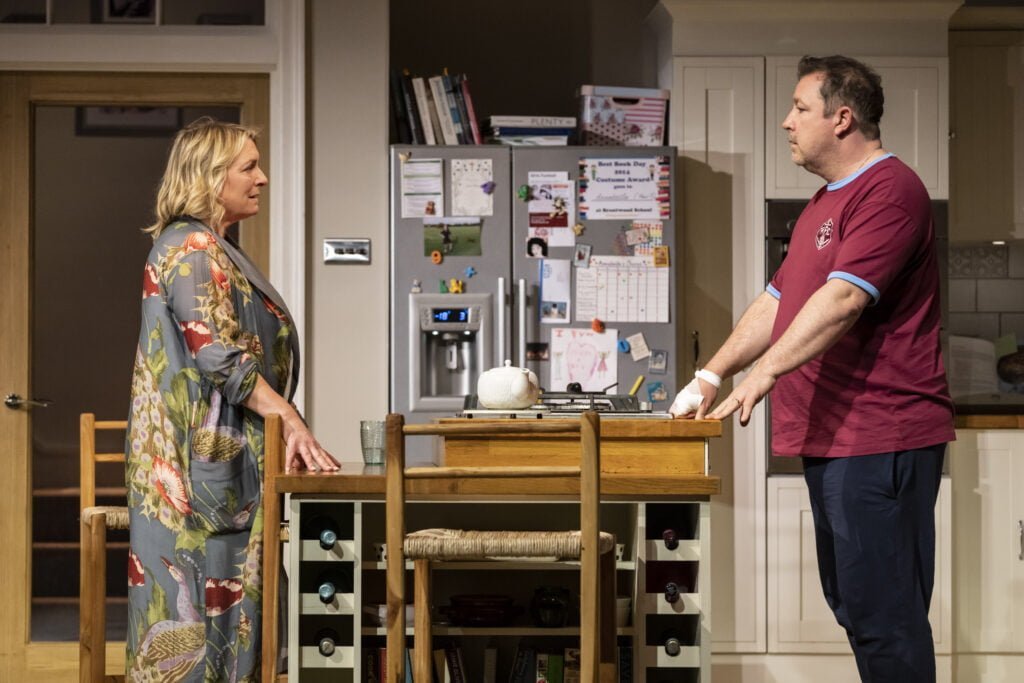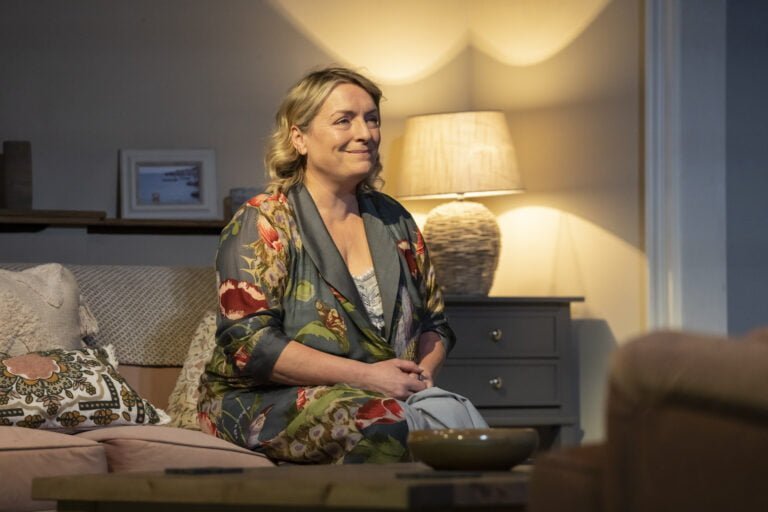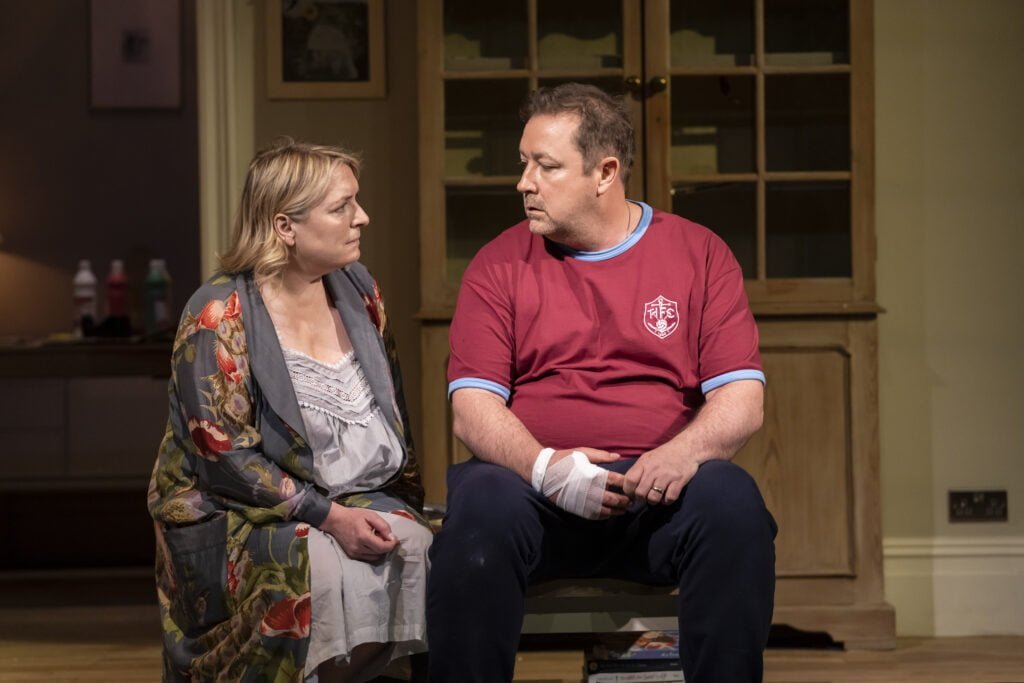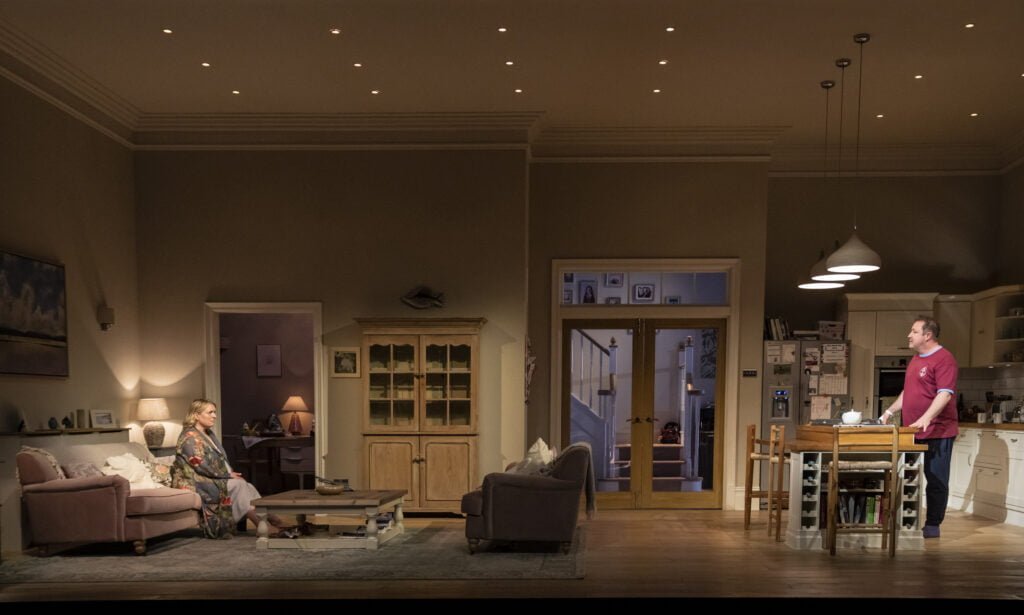Middle: Love under an emotional microscope
“You know what”, declares Gary, “…It’s overrated… ”
“What is?” asks his wife Maggie.
“…Complete honesty”.

Maggie (Claire Rushbrook) has stayed up late to have the kind of heart-to-heart that she feels has been missing from their marriage since the IVF-haunted birth of their little girl Annabelle (who is very much Daddy’s little girl to Maggie’s guilty desolation).
She has come to the conclusion that she does not love her husband anymore and – though it has stopped short of having sex – she has lost her heart to a decent bookish bloke who is respectful of the feelings of his current wife and refuses to rush things.
Maggie is first seen warming some milk in a pan on the kitchen island in their six-bedroom abode in Crouch End.
Gary (Daniel Ryan) shows his aghast hurt and anger at her revelation by systematically smashing all the plates from the kitchen dresser. This episode is creatively grateful to Edward Albee’s The Goat, or Who is Sylvia in which the wife makes dangerous flying missiles of the kitchen crockery when she hears that her husband has fallen in love with the eponymous cloven-footed creature. (Eldridge may have seen this play in Ian Rickson’s great revival of it a few years back at the Theatre Royal, Haymarket.)
Having punched in the glass, Gary immediately howls with pain as he withdraws his furied hand, which gushes blood and is tended to by a solicitous Maggie who urges him to have some leftover limoncello (a beverage he associates with having a weekend slap-up at the local Italian).
Eldridge and the National Theatre had a huge hit with Beginning a few years back. Middle – the second part of what is building into a superb almost symphonic trilogy for two voices – is, for my money, even more skilled and penetrating and humane.
Maggie (unimprovably played by the luminous Claire Rushbrook) and (ditto Daniel Ryan in his balletic middle-aged-pregnant-geezer look) are not the same couple who are circuitously edging their way to pregnancy and a trial relationship at the centre of Belonging. In the nature of things, there are strong family resemblances.
Maggie and Gary grew up just two miles away from each other in Essex, the author’s native county. But Gary is a market barrow boy turned doting aspiring pater familias who has been honourably confined/limited to everything for his family. Maggie’s folk were nobbier. They could have come from different planets poshness-wise.
“Be honest,” fumes Gary “[Your parents] find me crass. . . .They find my taste naff. When I told your mum I was think of finding us a villa in Fuengirola, she looked like I’d had a Jimmy Riddle in her lapsang souchong!”

Eldridge has lost none of his ability to steer dialogue from raw intensity to the belly flops of bathos. In fact, this talent has intensified and become multifoliate as this quartet has developed its own centripetal momentum, as the waltzer at a fairground.
The voice I hear behind it all is that of Philip Larkin. Perhaps I can try to demonstrate the difference between Maggie and Gary by suggesting a Larkin poem that would get a belly laugh from Gary and one that would appeal to the upwardly mobile tastes of Maggie.
First off Administration (which Larkin wrote in 1965)
That would get a filthy, fruity guffaw from Gary.
An Arundel Tomb (from Larkin’s 1965 volume The Whitsun Weddings) would appeal to Maggie.
You will remember that this poem involves Larkin noticing that in the pre-baroque effigy of the married earl and countess “One sees, with a sharp shock/His hand withdrawn, holding her hand”. The poem gradually mounts to into magnificent peroration –
“Time has transfigured them into/Untruth. The stone fidelity/They hardly meant has come to be/Their final blazon, and to prove/Our almost-instinct almost true/What will survive of us is love”.
I thought I was up to speed with the tropes and trips of Eldridge’s imagination and the dips and dives of his sense of humour. But I have to confess that I was knocked for six and moved to tears by Middle. The production reunites the supple subtle team who did such a magnificent job on Beginning – director Polly Findlay, supreme master of pacing, with set by Fly Davis and lighting design by Rick Fisher.
I also have to say that piece of sheer writing that I most admire in this play are the speeches where Maggie gets to explain herself.
There is some wonderful clowning where the couple recall the sexy sex they used to have before IVF, endometriosis, and daddy’s working himself to an early grave so they can pay the fees on private schooling for their little princess. This left Maggie feeling ashamed of feeling ungrateful and guilty that she wanted more than to be a 24/7 mum.
Gary has accidentally chanced on private feed and noticed the incidence of wank-worthy stuff about men with truncheon-sized penises and stuff. Wanting to reignite their sex-life, it is typical of Gary, and a sign of why she will never get him out of him out of her system, that he overcame the instincts of a lifetime, and writhed into the Romford branch of Ann Summers to buy her a proud vibrator. And it is a mark of Eldridge’s bang-on instinct for comedy that the man she thinks she has fallen in love with is a policeman (but they had phased out truncheons by the time John joined the force…) and that he is so right-on and solicitous of the feelings of his current wife that he surmises it is too early to think of having full adulterous with Maggie.

Here is Maggie on the desolation and the isolation and the guilt of being a 24/7 Mum.
“Five years of mums. Mum-ness. I’ve written the book, got the badge. There’s not a children’s entertainer in Essex I’m not on first name terms with. Awesome Andrew sends me a personalised e-Christmas-card…”
The author of Middle is rightly proud of his working-class parents who bought their council house in the Thatcher-era and scrimped and saved to pay off the mortgage. Eldridge is a credit to this community. But I think that the best bits of Middle are where he enters the mind-set of Maggie and the expectations of her community. There is a wonderful bit (shiver-inducingly played by Rushbrook) where she talks of her aspirations in the vacation before she went to Exeter University (which is Eldridge’s alma mater). With a summer job in Boots in Romford, Maggie had daydreamed that, for her progress to her university, parents have bought her the bashed-up VW Beetle she had noticed parked in the Essex street.
On her 19th birthday, she receives the bequest of diamond ring from a beloved granny. Now she will be able to purchase the car and all her fantasies can come true. Except the car is unaccountably nicked – a baffling blow – that, for me, is the most truly empathetic moment in this piece.
Middle is a play of exquisite equipollence. You admire both these people; you understand where they are coming from. Your heart bleeds for both.
“You see this teapot…” says Gary in the final moments of the play, “We must always keep this teapot. Whatever happens and wherever we go. It’s precious.”
“How come?”
“It survived”
If we are lucky and if we take a depth-sound stethoscope to ourselves, our almost-instinct may prove almost true, and, in Philip Larkin’s words in An Arundel Tomb “What will survive of us is love”

Production Notes
Middle
Written by David Eldridge
Directed by Polly Findlay
Cast
Starring:
Claire Rushbrook
Daniel Ryan
Creatives
Director: Polly Findlay
Designer: Fly Davis
Movement: Anna Morrissey
Lighting Designer: Rick Fisher
Sound Designer: Donato Wharton
Information
Running Time: One hour 45 minutes without an interval
Booking to 18th June 2022
Theatre:
Dorfman Theatre
National Theatre
Upper Ground
South Bank
London SE1 9PX
Oaklands Way
Rail/Tube : Waterloo
Telephone: 020 7452 3000
Website: nationaltheatre.org.uk
Reviewed by Paul Taylor at the Dorfman Theatre
on 4th May 2022
